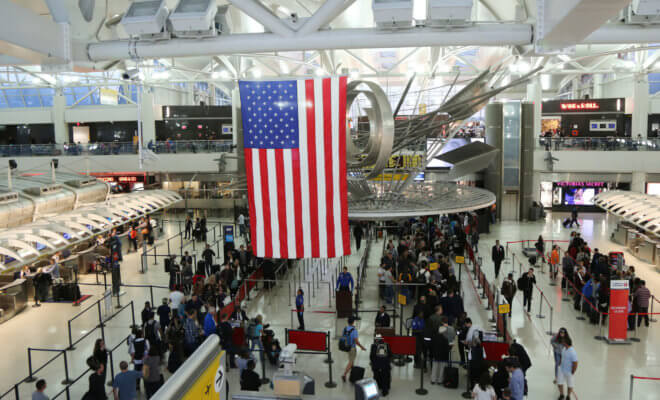Immigration
New U.S. Rule Increases Deportation Risk for H-1B Visa Holders, Green Card Recipients

JFK International Airport in New York.
Photo: Bigstock
H-1B visa holders whose applications for extension of the visa have been denied, and who have completed the initial term of stay, are likely to be placed into deportation proceedings, according to new USCIS guidelines.
H-1B visa and green card holders could face risks of deportation from the United States under a new policy memorandum issued by the U.S. Citizenship and Immigration Services (USCIS). According to the new guidelines, released on June 28, which came into the public domain last week, H-1B visa holders whose applications for extension of the visa have been denied, and who have completed the initial term of stay, are likely to be placed into deportation proceedings.
The USCIS will issue the immigrant a Notice to Appear (NTA) before an immigration court if, upon the denial of an application or petition, the applicant is “unlawfully present in the United States,” says the new policy. The NTA is a document given to an immigrant that instructs them to appear before an immigration judge on a certain date in order to place a person into deportation proceedings.
“Under the new guidance, USCIS officers will now issue an NTA for a wider range of cases where the individual is removable and there is evidence of fraud, criminal activity, or where an applicant is denied an immigration benefit and is unlawfully present in the United States,” the USCIS said in a statement.
“For too long, USCIS officers uncovering instances of fraudulent or criminal activity have been limited in their ability to help ensure U.S. immigration laws are faithfully executed. This updated policy equips USCIS officers with clear guidance they need and deserve to support the enforcement priorities established by the president, keep our communities safe, and protect the integrity of our immigration system from those seeking to exploit it,” USCIS Director L. Francis Cissna said in the statement.
Earlier, if a person’s application was denied, the immigrant could leave the United States quickly, and then try to get another visa to return to the country. However, with the new changes, the person will have to remain in America and appear before an immigration judge. Failure to appear for the proceedings carries a five-year ban on the person for re-entry to the United States, the Forbes reported, citing Jennifer Minear, a director in the immigration practice group at McCandlish Holton.
If the individual remains in the country to contest the removal proceedings, he or she would be considered “unlawfully present” during all of that time, Minear added.
“If the individual prevails in the removal proceedings, his or her status will be restored and the unlawful presence will be wiped away. But if the individual loses, he or she will likely be subject to a 10-year bar on re-entering the U.S., depending on how much unlawful presence accrued by the time the final deportation order was entered,” she told the publication, adding that many H-1B visa holders whose applications for initial or extended H-1B status are denied are likely to face deportation proceedings under this policy.
People awaiting the conclusion of removal proceedings generally do not have any work authorization available to them, the report added.
Even international students would come under the ambit of the new policy. “Unauthorized employment, failure to enrol in classes or failure on part of the educational institute to update a student’s records could result in an unlawful status for students and issue of a NTA,” the Times of India quoted Snehal Batra, managing attorney, NPZ Law Group, as saying.
The new policy also says that cases of documented immigrants where fraud or misrepresentation is substantiated, or of an applicant found to have “abused any program related to the receipt of public benefits,” will require the USCIS to issue a Notice to Appear.
Immigrants with legal residence permits, known as green cards, can avail of public service benefits such as Medicaid, Supplemental Nutrition Assistance Program, Supplemental Security Income, and the Children’s Health Insurance Program. The Department of Homeland Security had earlier proposed rejection of residency permits to legal immigrants if they or their children receive federal or state aid, including food stamps and early childhood education programs, the Miami Herald reported.
“An alien’s receipt of public benefits comes at taxpayer expense and availability of public benefits may provide an incentive for aliens to immigrate to the United States,” the DHS draft had said in February this year.



